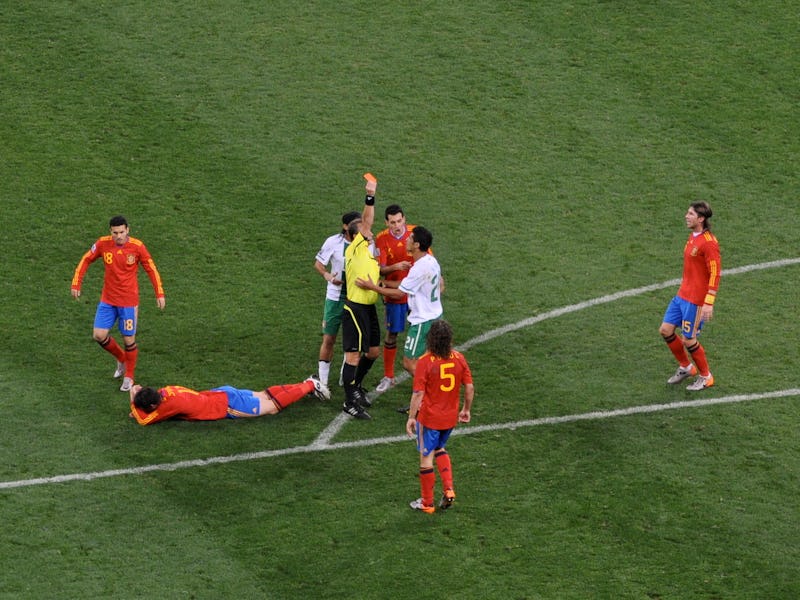World Cup's New Video-Assisted Referees Can Bias the Game, Warns Scientist
"Referees should be aware of this. It’s very important."

A new study from the University of Leuven, Belgium appears to confirm what soccer fans have been saying for years: Video replay will change the game. Nevertheless, a FIFA panel announced this winter that video replay will make an appearance at the 2018 World Cup in Russia, so it’s time to live with the consequences. One of these consequences, the researchers say, could mean the difference between no card and a red card.
Video-assisted referees (VARs) have been banned from the most prestigious soccer leagues, even in the most obvious of circumstances, such as in the 2010 World Cup when Luis Suarez’s obvious handball stopped Ghana from scoring a game-winning goal. “VAR is useful for judging whether something happened in or outside of a penalty area,” study author and biomedical kinesiologist Jochim Spitz, Ph.D. tells Inverse. But his research found that reviewing calls in slow motion can make referees unnecessarily harsh.
Diego Maradonna's 1986 "hand of god" goal (pre-VAR) is probably the most famous handball of all time
“For all people watching the World Cup, referees, spectators, journalists, they should be aware that when they look back at the footage, slow motion can change the perception of a foul,” Spitz says. “When it comes to judging intensity you have to review it in real time.”
Spitz and his team showed 88 active professional referees 60 video clips that had been reduced to one-fourth of the real-time speed. When they asked the referees to judge the severity of the foul, they found that the referees handed out 36 yellow cards, 18 red cards, four “no calls,” and two fouls with no card penalty. They then compared these decisions to real-time “reference decisions” handed out by two former Champions League referees.
“In case of high-impact tackle incidents, there is a clear impact of slow motion, altering the judgment of the referees towards more severe disciplinary sanctions for the offending players,” the team writes in the paper.
Other issues with VAR include drawing straight lines. Like this offside line that enraged Manchester United fans
Spitz hypothesized that re-watching film messes with “spatiotemporal predictability”: Referees watching the clips in slow motion perceive that players had more time to avoid the collision, even if in real time, the foul was unavoidable. This allows referees to infer premeditation or intentionality to a foul, when it might really have just a split-second decision or even an accident.
In Russia, VAR will be used in four circumstances: to determine goals, penalties, review red cards, and cases of mistaken identity. It’s written into the VAR rulebook that they should judge severity of fouls in real-time, not slow motion. Still, Spitz argues that referees should be on the lookout for potential bias during review.
“Referees should be aware of this,” Spitz said. “It’s very important.”